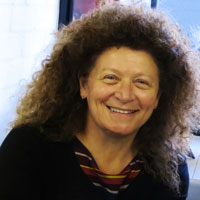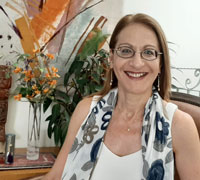We are pleased to report on the recently completed colloquium on Dana Amir’s (2019) “The Malignant Ambiguity of Incestuous Language.” We appreciated the contributions of panelists Galit Atlas (USA), Alyona Chukanova (Ukraine), Simone Drichel (New Zealand), Uri Hadar (Israel), Peter Maduro (USA), Esther Rapoport (Israel), Paul Renn (UK) and Marie Saba (Peru).
We found the colloquium to be a graceful discussion that managed to accommodate theory, personal experience and clinical process. Many of the contributors described attempts to psychoanalytically accompany victims in the hollowness and terror of incestual experience. Some daringly shared their own experiences. These voices, poignant on our screen, allowed us a sense of the incomprehensible. The acute freshness and impact of distant memories spoke to the power of trauma’s encapsulation.
We try to conceptualize this raw emotion. We risk thinking the Bionian thought, borne of mating and containment. We try to theorize, i.e. to make meaning, make meaningful. Yet, needless to say, we remain unknowing; the (traumatized) other is forever unknown. Every analytic dyad has its own play of words and silence, theory and enactment. The dyads are never the same, rarely are we the same, across our various analytic dyads. Can we both theorize and hold “the utmost regard for how the person telling this story experienced it,” even for the love of their perpetrator? Can we believe that at times contextuality eclipses even universal taboo?
Imperfect, impossible as it is, we try to hold both ends of the stick, believing that this facilitates the movement that is our business: The “movement talk” or the “moving talk” is a talk “about the rhythm of life, of inter-lives.” It is the life-force that pushes us towards others, towards a commonality of meaning that always fails in the face of the unique. We believe it heals the irreparable. This is what makes us psychoanalysts, or perhaps, just human.
We hope that the IARPP community was as enthralled and stimulated by the discussion as we were. It is our privilege to moderate this series, and we look forward to the next colloquium on the calendar, May 11-22, 2022. We are planning a discussion of relational technique, with specific focus on the thorny and highly relevant issue of self-revelation.
Until then, we send our best regards.
Cathy Hicks and Shlomit Yadlin Gadot, Co-Chairs
 Cathy Hicks
Cathy Hicks
Syndey, Australia
Email Cathy Hicks
 Shlomit Yadlin Gadot
Shlomit Yadlin Gadot
Ramat Hasharon, Israel
Email Shlomit Yadlin Gadot
![]()
הקולוקוויום האחרון שלנו דן במאמרה של דנה אמיר (2019):
“The Malignant Ambiguity of Incestuous Language.”
אנחנו מודות מעומק לב על התרומה הנדיבה והמשכילה של חברי.ות הפאנל בקולוקוויום: גלית אטלס (ארה”ב), אליונה צ’וקנובה (אוקראינה), סימון דריכל (ניו זילנד), אורי הדר (ישראל), פיטר מדורו (ארה”ב), אסתר רפפורט (ישראל), פול רן (אנגליה) ומריה סאבא (פרו).
הקולוקוויום סביב מאמרה של דנה על שפת המעוול שילב תיאוריה, חוויה והתנסויות קליניות בהקשר הטעון של גילוי עריות. רבים ממשתתפי הדיון תיארו את נסיונםן לחוות ולרפא משהו מן האימה והצלקות של קורבנות ההתנסות האנססטואלית. היו משתתפים שבאומץ רב חשפו חוויות אישיות. קולםן העוצמתי שטף את המסך שלנו ואפשר לנו לחוות את מה שלא ניתן להבנה ולניסוח. האקוטיות והעוצמה של זיכרונות העבר הרחוק דיברו את עוצמת האנקפסולציה של טראומה.
כמו בקליניקה ניסינו לתת מילים וצורה לרגש הגולמי. הסתכנו בניסיון לחשוב את המחשבה הביוניאנית, שלידתה במפגש ובהכלה. ניסינו לחשוב באופן תיאורטי, לייצר משמעות מתהומות של אין. ונותרנו כמובן, במידה רבה, ללא יודעים, ללא ידיעה. כל דיאדה טיפולית יוצרת מרחב ייחודי של מילים ושתיקה, של תיאוריה וגילומים בפעולה. הדיאדות תמיד ייחודיות, וגם אנחנו כמטפלים שונים בנוכחותנו מעבר לדיאדות שאנחנו שותפים ביצירתן. האם ניתן כלל גם “לחשוב תיאוריה” וגם “לכבד באופן מוחלט את האופן שאדם חווה מספר את סיפורו”? האם ניתן לעשות זאת באופן שיאפשר לנו להבין גם את אהבתו הבלתי אפשרית של הקרבן לתוקף שלו? האם נוכל להאמין שלעיתים ההקשרי מאפיל על טאבו אוניברסלי?
כמיטב יכולתנו אנחנו מנסים לאחוז בשני קצותיו של המקל, מתוך האמונה שהחזקה מעין זו היא שמניעה את תנועת הנפש. “הדיבור הנע” או “המניע” הוא דיבור על “קצבי חיים; חיים השזורים אלה באלה”. דחף החיים הוא שמניע אותנו לעבר האחר, לעבר שותפות במשמעויות שדינן תמיד להתפוגג בפני הייחודי. אנחנו מאמינים שדיבור זה יש בו מן הריפוי גם עבור מה שאיננו ניתן לתיקון. זה מה שהופך אותנו למטפלים, או אולי פשוט- לבני אדם.
אנחנו מקווים שהקהילה ההתייחסותית הפיקה מהדיון המורכב שהתנהל. עיננו נשואות כעת לקולוקוויום האביב אשר יתקיים בין ה 11 ל 22 במאי. הקולוקוויום הבא יוקדש לדיון בשאלת הטכניקה של טיפול התייחסותי, עם דגש מיוחד על נושא נפיץ ורלוונטי בתוכו : חשיפה עצמית.
מקוות לפגוש אתכםן בדיונים הבאים שלנו.
בתודה ובהערכה,
קת’י היקס ושלומית ידלין-גדות
יו”ר במשותף של ועדת הקולוקוויום
 Cathy Hicks
Cathy Hicks
Syndey, Australia
Email Cathy Hicks
 Shlomit Yadlin Gadot
Shlomit Yadlin Gadot
Ramat Hasharon, Israel
Email Shlomit Yadlin Gadot

